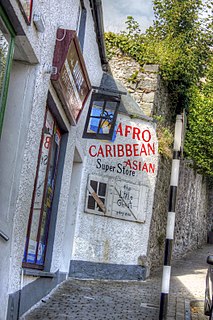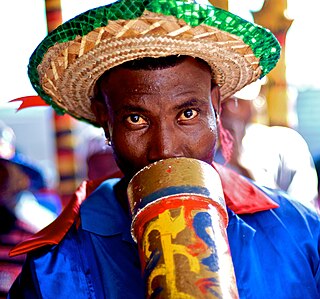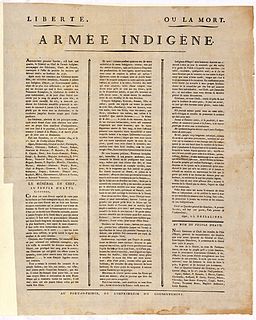
The African diaspora is the worldwide collection of communities descended from native Africans or people from Africa, predominantly in the Americas. The term most commonly refers to the descendants of the West and Central Africans who were enslaved and shipped to the Americas via the Atlantic slave trade between the 16th and 19th centuries, with their largest populations in the United States, Brazil and Haiti. However, the term can also be used to refer to the descendants of North Africans who immigrated to other parts of the world. Some scholars identify "four circulatory phases" of this migration out of Africa. The phrase African diaspora gradually entered common usage at the turn of the 21st century. The term diaspora originates from the Greek διασπορά which gained popularity in English in reference to the Jewish diaspora before being more broadly applied to other populations.

In the context of the history of slavery in the Americas, free people of color were primarily people of mixed African, European, and Native American descent who were not enslaved. However, the term also applied to people born free who were primarily Black African with little mixture. They were a distinct group of free people of color in the French colonies, including Louisiana and in settlements on Caribbean islands, such as Saint-Domingue (Haiti), St. Lucia, Dominica, Guadeloupe, and Martinique. In these territories and major cities, particularly New Orleans, and those cities held by the Spanish, a substantial third class of primarily mixed-race, free people developed. These colonial societies classified mixed-race people in a variety of ways, generally related to visible features and to the proportion of African ancestry. Racial classifications were numerous in Latin America.

The Haitian Revolution was a successful insurrection by self-liberated slaves against French colonial rule in Saint-Domingue, now the sovereign state of Haiti. The revolt began on 22 August 1791, and ended in 1804 with the former colony's independence. It involved black, biracial, French, Spanish, British, and Polish participants—with the ex-slave Toussaint Louverture emerging as Haiti's most charismatic hero. The revolution was the only slave uprising that led to the founding of a state which was both free from slavery and ruled by non-whites and former captives. It is now widely seen as a defining moment in the history of the Atlantic World.

Afro-Caribbean people or African Caribbean are Caribbean people who trace their full or partial ancestry to Sub-Saharan Africa. The majority of the modern African-Caribbeans descend from Africans taken as slaves to colonial Caribbean via the trans-Atlantic slave trade between the 15th and 19th centuries to work primarily on various sugar plantations and in domestic households. Other names for the ethnic group include Black Caribbean, Afro or Black West Indian or Afro or Black Antillean. The term Afro-Caribbean was not coined by Caribbean people themselves but was first used by European Americans in the late 1960s.
Afro-Caribbean music is a broad term for music styles originating in the Caribbean from the African diaspora. These types of music usually have West African/Central African influence because of the presence and history of African people and their descendants living in the Caribbean, as a result of the trans-Atlantic slave trade. These distinctive musical art forms came about from the cultural mingling of African, Indigenous, and European inhabitants. Characteristically, Afro-Caribbean music incorporates components, instruments and influences from a variety of African cultures, as well as Indigenous and European cultures.

Slavery in the Spanish American colonies was an economic and social institution which existed throughout the Spanish Empire including Spain itself. In its American territories, Spain displayed an early abolitionist stance towards indigenous people although Native American slavery continued to be practiced, particularly until the New Laws of 1543. The Spanish empire, however was involved in the enslavement of people of African origin. Although the Spanish often depended on others to obtain enslaved Africans and transport them across the Atlantic, the Spanish Empire was a major recipient of enslaved Africans, with around 22% of the Africans delivered to American shores ending up in the Spanish Empire.

Rara is a form of festival music that originated in Haiti that is used for street processions, typically during Easter Week. The music centers on a set of cylindrical bamboo trumpets called vaksin, but also features drums, maracas, güiras or güiros, and metal bells, as well as alsos which are made from recycled metal, often coffee cans. The vaksin perform repeating patterns in hocket and often strike their instruments rhythmically with a stick while blowing into them. In the modern day, standard trumpets and saxophones may also be used. The genre though predominantly Afro-based has some Taino Amerindian elements to it such as the use of güiros and maracas.
Sidney Wilfred Mintz was an American anthropologist best known for his studies of the Caribbean, creolization, and the anthropology of food. Mintz received his PhD at Columbia University in 1951 and conducted his primary fieldwork among sugar-cane workers in Puerto Rico. Later expanding his ethnographic research to Haiti and Jamaica, he produced historical and ethnographic studies of slavery and global capitalism, cultural hybridity, Caribbean peasants, and the political economy of food commodities. He taught for two decades at Yale University before helping to found the Anthropology Department at Johns Hopkins University, where he remained for the duration of his career. Mintz's history of sugar, Sweetness and Power, is considered one of the most influential publications in cultural anthropology and food studies.

The Black Jacobins: Toussaint L'Ouverture and the San Domingo Revolution is a 1938 book by Trinidadian historian C. L. R. James, a history of the Haitian Revolution of 1791–1804. He went to Paris to research this work, where he met Haitian military historian Alfred Auguste Nemours. James's text places the revolution in the context of the French Revolution, and focuses on the leadership of Toussaint L'Ouverture, who was born a slave but rose to prominence espousing the French Revolutionary ideals of liberty and equality. These ideals, which many French revolutionaries did not maintain consistently with regard to the black humanity of their colonial possessions, were embraced, according to James, with a greater purity by the persecuted blacks of Haiti; such ideals "meant far more to them than to any Frenchman."
John K. Thornton is an American historian specializing in the history of Africa, the African Diaspora and the Atlantic world. He is a professor in the history department at Boston University.
Richard Price is an American anthropologist and historian, best known for his studies of the Caribbean and his experiments with writing ethnography.

The Haitian Declaration of Independence was proclaimed on 1 January 1804 in the port city of Gonaïves by Jean-Jacques Dessalines, marking the end of 13-year long Haitian Revolution. The declaration marked Haiti becoming the first independent nation of Latin America and only the second in the Americas after the United States.
For a history of Afro-Caribbean people in the UK, see British African Caribbean community.
Afro-Haitians are Haitians who trace their full or partial ancestry to Sub-Saharan Africa. They form the largest racial group in Haiti and together with other Afro-Caribbean groups, the largest racial group in the region.

Abolitionism in the United Kingdom was the movement in the late 18th and early 19th centuries to end the practice of slavery, whether formal or informal, in the United Kingdom, the British Empire and the world, including ending the Atlantic slave trade. It was part of a wider abolitionism movement in Western Europe and the Americas.

Slavery in Cuba was a portion of the larger Atlantic Slave Trade that primarily supported Spanish plantation owners engaged in the sugarcane trade. It was practised on the island of Cuba from the 16th century until it was abolished by Spanish royal decree on October 7, 1886.
The Wesley Logan Prize is an annual prize given to a historian by the Association for the Study of Afro-American Life & History

Laurent Dubois is the Marcello Lotti Professor of Romance Studies and History and founder of the Forum for Scholars & Publics at Duke University. His studies have focused on Haiti.

Julius Sherrod Scott III was an American scholar of slavery and Caribbean and Atlantic history. He is best known for his influential doctoral thesis and later book The Common Wind: Afro-American Currents in the Age of the Haitian Revolution. Scott's original thesis has been regarded as "arguably the most read, sought after and discussed English-language dissertation in the humanities and social sciences during the 20th century", elevating the historian to the position of an intellectual "cult figure among scholars" in the field.











